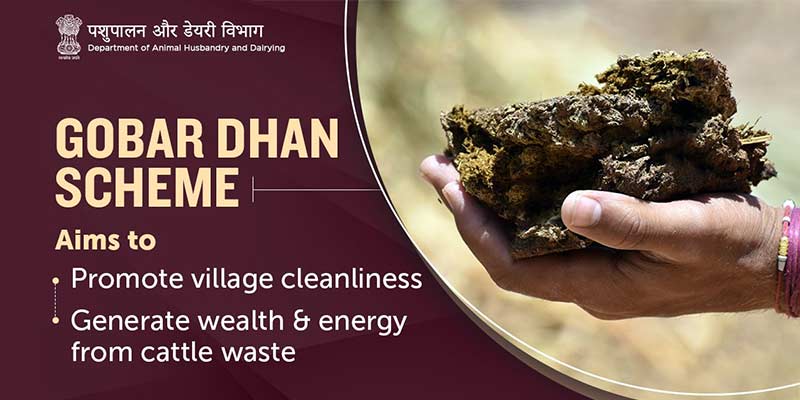- India
- Feb 04
Explainer / Unified portal on GOBAR-Dhan
The government launched a unified portal on the GOBAR-Dhan scheme, an initiative aimed at managing cattle and biodegradable waste and also help enhance farmers’ income.
What is GOBAR-Dhan scheme?
• In an effort to make the villages open defecation free and improve the lives of villagers, the government launched Galvanizing Organic Bio-Agro Resources Dhan (GOBAR-DHAN) scheme in 2018.
• It aims to ensure cleanliness in villages by converting bio-waste including cattle waste, kitchen leftovers, crop residue and market waste. This will provide economic and resource benefits to farmers and households.
• GOBAR-Dhan will benefit rural people in general and women in particular from the use of clean fuel, improved cleanliness in villages and through improvement in health. The WHO estimates about five lakh deaths in India alone due to indoor air pollution caused by unclean cooking fuel. Women and children suffer the most, as they spend large amounts of their time near indoor cooking hearth.
• This initiative will support biodegradable waste recovery and conversion of waste into resources, reduction of greenhouse gas (GHG) emissions, reduction in import of crude oil, give boost to entrepreneurship and promote organic farming.
• The Department of Drinking Water and Sanitation is working with concerned departments/ ministries/state governments, public and private sector institutions and village communities to give this a shape of ‘Jan Andolan’ so that community collective action on GOBAR-Dhan is achieved.
• It provides technical assistance and financial support of upto Rs 50 lakh per district to achieve safe disposal of cattle and organic waste.
Objectives of the scheme:
• Support villages safely manage their cattle waste, agricultural waste and in long run all organic waste.
• Support communities convert their cattle and organic waste to wealth using decentralised systems.
• Promote environmental sanitation and curb vector borne diseases through effective disposal of waste in rural areas.
• Convert organic waste, especially cattle waste to biogas and fertiliser for use in rural areas.
• Promote rural entrepreneurship employment and income generation opportunities.
Benefits of the scheme:
• Effective biodegradable waste management.
• Reduction of greenhouse gas (GHG) emissions.
• Reduction in import of crude oil.
• Employment opportunity for the local community.
• Boost to entrepreneurship.
• Additional income for farmers/ local village communities from organic waste.
• Promotion of organic farming.
Unified portal of GOBAR-Dhan
• A unified portal was jointly launched by Union ministers. The new unified approach and portal will ensure close coordination with stakeholders, departments/ministries for smooth implementation of biogas schemes/initiatives and its real-time tracking.
The key stakeholders are:
• Ministry of New and Renewable Energy
• Ministry of Petroleum and Natural Gas
• Department of Drinking Water and Sanitation
• Department of Animal Husbandry and Dairying
• Department of Agriculture, Cooperation and Farmers Welfare
• Department of Agricultural Research and Education (DARE)
• Department of Rural Development.
These ministries/departments are implementing various programmes like:
• New National Biogas and Manure Management Programme (NNBOMP) of MNRE.
• Biofuel Policy and Sustainable Alternative towards Affordable Transportation (SATAT) of Ministry of Petroleum and Natural Gas.
• Cooperative schemes through the National Dairy Development Board (NDDB) of Animal Husbandry Department.
• Under the new unified approach, all these programmes/schemes will be coordinated by the Department of Drinking Water and Sanitation under the Swachh Bharat Mission - Gramin (SBMG).
Manorama Yearbook app is now available on Google Play Store and iOS App Store


